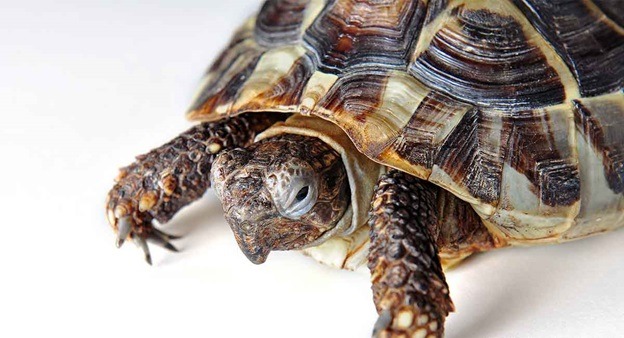Tortoises are loving and entertaining pets that practically survive in most living environments. These are intelligent creatures who are tolerant of human behaviour, such as handling and training, while a certain amount of care is required to maintain good health.
Various care sheets will generally help you with the optimal information you need to keep your tortoise healthy, but keeping a pet healthy for a long duration depends on the effective elimination of various bad habits that owners ignore while caring for their pets.
The average lifespan of most tortoises is 60-100 years when fed and cared for properly. Therefore, when you adopt a tortoise, the overall health of the tortoise becomes your ultimate responsibility.
Symptoms of Sick Tortoises
To be able to ascertain whether your tortoise needs a visit to the veterinarian or not, it is important to be adept with possible symptoms your tortoise might show in times of calamity.
Runny nose, labored breathing, swollen eyelids or sunken eyes, loss of appetite, loose stools, listlessness, prominent bones (in head or limbs), swollen body tissues, soft shell, noticeable weight loss or gain in a short period of time are the symptoms which might mean something is wrong with your pet tortoise.
Sick tortoises often lose their appetite. The texture of feces tells us a lot about tortoise health.
Fibrous, firm and brownish-green color feces with readily recognizable plant material signify a healthy tortoise. Loose, runny or mucous containing feces indicate a health problem worthy of veterinary attention
We all know how prevention is often better than cure. So, in this article, we have compiled a list of common tortoise ailments and ways to prevent them.
1. Stomatitis
Stomatitis/ mouth rot is a common condition in tortoises that is caused by the lodging of bacteria in an open wound resulting in infection in the lining of gums and mouth.
Loss of appetite, a white or cheesy looking discharge from the tortoise’s mouth, and swelling or colour change inside the tortoise’s mouth are the symptoms to look out for to diagnose stomatitis.
If you feel that your tortoise might be suffering from mouth rot, consult with a reptile specialist, and make sure that the water supply to your tortoise is squeaky clean.
2. Infectious Diseases In Tortoises
There are few infectious diseases in tortoises, such as chelonian herpesvirus and mycoplasma, these often cause runny noses (used to be called Runny Nose Syndrome-RNS). Therefore, prevention can be achieved by quarantine isolation of new tortoises and ideally not keeping different species together, especially mixing tropical species (such as leopard tortoises) with Mediterranean species (such as Hermans).
If you have any concerns about these types of infectious diseases, please speak to your exotic vet specialist for expert tortoise help.
3. Respiratory Ailments
Tortoises are prone to suffer from pneumonia and other respiratory complications. Labored breathing, running nose, inactivity, swollen eyelids, bulging of eyes, and loss of appetite are the signs of the onset of a respiratory ailment in your tortoise.
As tortoises with respiratory ailments often gasp for breath, they develop a habit of frequently moving their head and forelimbs in and out of their shell to ease breathing.
The incessant nasal discharge might result in white scar tissue around the nostrils. Though respiratory problems can often be treated with antibiotics, Chronic nasal discharge or raspy breathing might require immediate veterinary attention.
4. Dehydration And Malnutrition
While swollen body tissues and pasty or liquid feces are markers of malnutrition or infection, sunken eyes serve as proof of dehydration. A tortoise that is abnormally heavy for its size might be suffering from large bladder stones, a condition that can be treated only by a veterinarian.
Tortoises are relatively inactive during winter hibernation and the end of summer before the monsoon. But if your tortoise is developing a habit of keeping its eyes closed or portraying prolonged states of inactivity, it might be a cause of concern.
5. Bone Diseases
Most bone diseases arise in tortoises due to an imbalanced ratio of calcium to phosphorus, lack of sunlight or both. Such diseases often advance to cause shell deformities, pyramidical scutes on the upper shell, etc. Preventive measures include regular feeding of a proper diet to your tortoise and keeping them outdoors.
6. Vitamin Deficiencies
Nasal discharge and swollen eyelids in tortoises can also be a sign of a Vitamin A deficiency. A healthy and balanced diet is the only measure against this deficiency. Prolonged vitamin A deficiencies can cause permanent deformities of the shell.
7. Parasites
Parasites can cause fatigue accompanied by abdominal stress and weight loss. If all symptoms are present in your tortoise, consult a veterinarian immediately.
8. Always Wash Your Hands
Though tortoises cannot pass on pathogens to humans, a few pathogens like salmonella can be transferred from tortoises to humans. Therefore, children under the age of five should be discouraged from handling tortoises altogether, whereas adults should always wash their hands with anti-bacterial soap after handling one.
Other Signs That Your Tortoise Needs Veterinary Attention
- Respiratory problems
- Drooping head or limbs
- Not eating after hibernation
- Vomiting or weight loss
- Runny eyes or nose
- Lumps or swelling
- Gaping mouth
- Lethargy and weakness
Always remember to take necessary precautions when handling and feeding your tortoise. Never leave your tortoise unattended for long durations of time. Cater to the unique temperature and enclosure requirements responsible for the well-being of your pet tortoise’s species.



